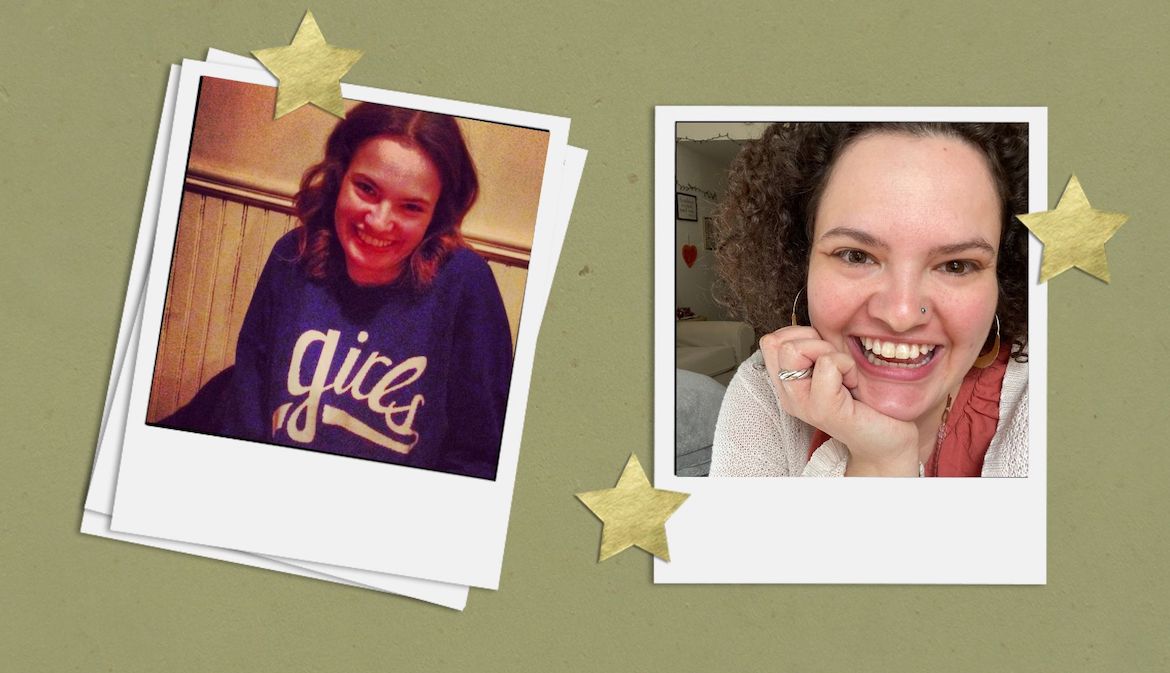Going to an all-girls school with frizzy hair and a body that seemed to be developing a whole lot faster than those around me was a recipe for disaster. When I was 13, my mom encouraged me to start straightening my curls, which led to weekly trips to the salon for a treatment followed by seven days dedicated to maintaining that straightness. I couldn’t get it wet. I couldn’t get it sweaty. I couldn’t put my hair up during the day or sleep on it too hard. My curls were my Achilles heel, and I refused to let anyone see what they actually looked like untamed. At the time, I preferred that the rest of the world see me for who I thought I wanted to be: A reflection of the blonde, skinny girls who bounced around the cafeteria like they were the main characters in their own TV shows. I felt too big, and assumed the rest of the world found me to be too much, too. So I made myself smaller and straighter.
Then, I went to college, and two things happened. Freshman year, I started watching Sex and the City, and grew to appreciate Carrie Bradshaw’s curls as a part of who she was (plus, she was a writer, something I desperately wanted to be)—even if I wasn’t quite there yet with my own hair. Then, Sophomore year, I discovered I was gay. I’m grateful that coming out was a pretty seamless process for me (and luckily I went to a college that basically shouted, “Don’t forget to bring your rainbow to class!”), and looking back, it makes perfect sense that this was when my relationship with my curls started to change. Revealing one truth was helping me adjust to another, and I began to feel more comfortable wearing my hair natural. I wasn’t all the way there, but I was getting closer.
By the time I graduated, my hair was cropped short and curled at the top (which, yes—made me look even more like my dad). It would still be several years until I fully stepped into my identity, but as I struggled with figuring out how to dress my body and be comfortable with bigger boobs and wider hips, I experimented with what it meant to be who I was. Devoting less time to taming my curls meant more time for introspection, writing, reading books, and getting outside. Instead of fighting with my hair, I started looking for ways to let pieces of my personality out: I got a few tattoos, pierced my cartilage, wore bright colors, and even dyed my hair red. In her best-selling book, Untamed, Glennon Doyle writes, “When a woman finally learns that pleasing the world is impossible, she becomes free to learn how to please herself.” And this was certainly the case for me.
Like so many people who were forced to distance themselves from their stylists during the 2020 lockdown, my relationship with my hair shifted once again in quarantine. In the months of stillness, my hair grew longer, and I celebrated small milestones like putting it up in a ponytail. I cut it myself just one time, but things felt different—it was like I had realized that cutting my hair was a way for me to dissociate from myself, and performing what had once been a ritual now felt like I was trying on someone else’s identity in the hopes that it would help me find my own.
Now, my partner (a fellow curly girl) frequently tells me how much she loves my hair, and never fails to make me feel beautiful for leaning into its thick, wild, and (on some days) unruly nature. I’ve been growing it out for the last few months, experimenting to see how long I can keep it without it driving me up the wall or requiring hours of in-shower detangling. And throughout the process, my hair has become an extension of my personality: vibrant, bold, and bouncy. After years of trying to look like everyone else, I finally look like me. And I’m exactly who I want to be.
